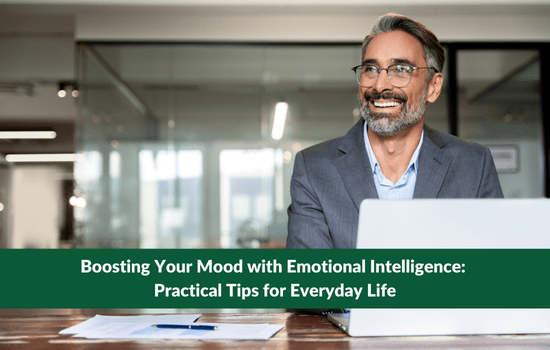Boosting your mood through emotional intelligence enhances well-being by fostering self-awareness and strengthening relationships. Discover practical tips to elevate your emotional intelligence for a more balanced and fulfilling life.
Mood-Boosting Secrets: The Power of Emotional Intelligence

Maintaining a positive mood can be challenging amidst stress, anxiety, and daily pressures, which can take a toll on our emotional well-being. However, emotional intelligence (EI) can help us navigate these challenges with greater resilience and ease. EI involves recognizing, understanding, and managing our emotions and empathizing with others. By honing these skills, we can improve our relationships, enhance our mental health, and boost our overall mood.
Understanding the Connection Between Emotional Intelligence and Mood
Did you know that moods aren't the same as emotions; moods are long-term emotional states that profoundly affect our health, quality of life, and decision-making. Unlike emotions, which are often fleeting, moods can linger and have a significant impact. Practicing and improving emotional intelligence can enhance our ability to manage and shift moods effectively, leading to better emotional well-being and healthier relationships.
Techniques and Strategies to Understand and Respond to Emotions Constructively
Implement these techniques and strategies to better understand your emotions and respond to them constructively, improving your emotional well-being and relationships:
- Practice Mindfulness and Meditation:
- Mindfulness: Use mindfulness practices to stay present and observe your emotions without judgment. This strategy helps identify and understand your emotions as they arise.
- Meditation: Regular meditation can help calm the mind and provide clarity, making it easier to understand and manage emotions.
- Keep an Emotion Journal:
- Daily Reflection: Write down your emotions and the events that triggered them. This practice helps you recognize patterns and gain insights into your emotional responses.
- Identify Triggers: Note specific situations or people that frequently cause certain emotions, allowing you to anticipate and manage these triggers more effectively.
- Develop Self-Awareness:
- Self-Reflection: Spend time reflecting on your thoughts, feelings, and behaviours. Ask yourself why you feel a certain way and how your emotions influence your actions.
- Seek Feedback: Ask trusted friends or family about your emotional responses. This external perspective can provide valuable insights into your behaviour.
- Enhance Emotional Vocabulary:
- Expand Your Vocabulary: Learn to label your emotions accurately. Instead of saying you feel "bad," identify if it's frustration, sadness, anger, or another specific emotion.
- Express Emotions Clearly: Practice articulating your emotions in words. This clarity helps you understand and communicate your feelings to others.
- Practice Emotional Regulation:
- Deep Breathing: Use deep breathing exercises to calm yourself during intense emotional moments. This technique helps in managing immediate emotional reactions.
- Pause and Reflect: When you feel a strong emotion, take a moment to pause and consider your response. This practice helps respond constructively rather than impulsively.
- Develop Empathy:
- Active Listening: Practice active listening when interacting with others. This act helps in understanding their emotions and fostering empathy.
- Put Yourself in Others' Shoes: See situations from others' perspectives. This practice enhances empathy and improves emotional connections with others.
- Set Healthy Boundaries:
- Know Your Limits: Understand your emotional limits and set boundaries to protect your emotional well-being.
- Communicate Boundaries: Communicate your boundaries to others, ensuring they respect your emotional needs.
- Engage in Physical Activity:
- Exercise Regularly: Physical activity releases endorphins, which can improve your mood and help manage stress and anxiety.
- Practice Yoga: Yoga combines physical movement with mindfulness, promoting emotional balance and self-awareness.
- Seek Professional Help:
- Therapy: Consider speaking with a therapist or counsellor to gain deeper insights into your emotions and develop effective management strategies.
- Support Groups: Join support groups where you can share experiences and learn from others facing similar emotional challenges.
- Cultivate Positive Relationships:
- Surround Yourself with Supportive People: Build and maintain relationships with people who support and uplift you.
- Practice Gratitude: Regularly express gratitude for the positive aspects of your relationships, enhancing your emotional connections.
Using the power of emotional intelligence can elevate your life, cultivate positive emotions, and maximize your well-being. Start today by incorporating these practical tips into your daily routine and see how your mood and relationships improve.
For more insights, explore The Power of Emotion: A Practical Approach to Making the Most of Your Emotional Intelligence, or The Mindful Journal: Cultivating Emotional Intelligence through Reflective Writing for additional resources on emotional intelligence and well-being.
More Motivational Reads Here »
How Emotionally Intelligent Are You?
Sign up for Linda’s monthly tips to build your Emotional Intelligence and reduce Emotional Hijacking!

















